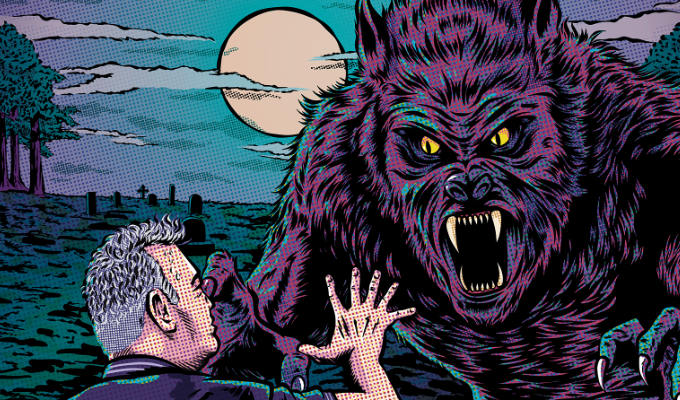Dear Cheggers...
Ashley Frieze writes an open letter
Dear Mr Chegwin,
It’s been a week of ups and downs for you. All this business about telling other people’s jokes has certainly kept you busy, eh? On the one hand, you’ve been on the receiving end of a lot of criticism; there has undoubtedly been a storm of tweets asking you to do things differently, or telling you, or begging, or maybe just calling you names. On the other hand, you have received increased media coverage and an increase in your Twitter following from 36,000 to 38,000, even when you discount the various people (myself included) whom you’ve blocked from following you.
As Gillian McKeith found out last week, social media has the habit of spreading news around the world incredibly quickly. As a result of the criticism for your joke telling, people are again remembering who you are, including the mistakes of your past. Maybe there’s no such thing as bad publicity, so maybe your fans have come out of the woodwork, thanks to this campaign.
Alternatively, maybe in your case, you just have followers, people who are prepared to receive your tweets, but would never go so far as to call themselves a fan. Either way, you’re in the spotlight.
So, what are the responsibilities of broadcasting to 38,000 followers? Never mind the rights you claim to have, which amount to the right to free speech, and to share your thoughts with your social network. I would propose that you have the responsibility to acting ethically and in a way that is not misleading.
I would propose that you do not have the right to profit personally from someone else’s work, especially at the detriment of that person. I would propose that you, as a public figure, have the responsibility to show some respect for the world of comedy that you’re strip mining for your own ends.
It seems that your argument is that there’s no harm in telling a joke, especially if you’re not necessarily claiming it as your own work. You also seem to think that it is not possible to claim ownership of a joke, or that many modern comedians are simply reusing old jokes.
From the direct message you sent to me – “All of the gags r my own - 1 or 2 r not. But I'm not gonna waste 140 characters explaining a gag posted was from Tommy Cooper who's dead” – when you strip away the logical irrelevance that all gags are your own, except the ones that aren’t, your opinion appears to be that it’s too much effort to credit the original author, especially if they’re dead.
While it’s probably true that texting a joke to a friend, or telling a joke down the pub is part of the culture of sharing jokes, and is nobody’s business except those involved, it’s a different proposition entirely when you’re broadcasting to 38,000 people. If you were to stand on stage at Glastonbury and sing someone else’s song (please don’t) then you would expect to pay performing rights. By knowingly reusing people’s material on Twitter, uncredited, you have decided that copyright doesn’t apply either to jokes or to you. I don’t believe you have the right to do that.
Not knowing who wrote a joke is no excuse, by the way. All lawyers, especially copyright lawyers, would tell you that ignorance is no defence in law. At the very least, though, you could retrospectively credit the gag when its author is identified.
It takes a lot of effort to write a good joke, as I’m sure you’ve realised by attempting to write your own. Excellent comedians don’t throw in someone else’s work to boost the quality (as do you), they work at finding and crafting real comic gems.
What you have decided to do not only profits from their efforts, but trivialises them into the bargain. Worse still, if a comedian tells one of their jokes, which one of your followers has read from your Twitter feed, it might even look like the professional comedian is passing off your work as their own, when it’s the opposite that is the case.
It would be easy to fix this. You could quote the name of the joke writer in brackets after the joke, rather then commenting on whether you like it. There’s space in the 140 characters to do this. Even better than that, you could retweet jokes from the various prolific joke Twitterers out there. The retweet preserves the identity of the original owner of the joke and also helps them to find followers.
Think about it. Not only do you get to entertain your followers, with minimal effort, but you also get to promote the very people whose material you are sharing. This would actually be really good. Unfortunately, when I suggested it to you, you blocked me from following you. I don’t really know how I should interpret that.
You are managing the message to your followers in a way that I find misleading. You talk of being bullied, and how the ‘comedy police’ might crucify people. All I think the comedy community wants from you is for you to show some respect. You are probably being bombarded by messages all saying the same thing, and I suppose this may feel like an onslaught that is out of proportion with something as simple as telling jokes online.
Hopefully you could come to understand that what you’re doing is not that simple, and that you could so easily get a good result for everybody if you made just a small change to your behaviour.
I’ve learned a lot about you this week, Keith Chegwin. I’ve learned that you have no interest in jokes as anything other than a cheap commodity that you can profit from as you publicise yourself and your bingo game. I’ve learned that you can’t take criticism. Worse still, I’ve learned that your naked penis wasn’t the worst thing I could have seen of you.
Yours sincerely
Ashley Frieze
Published: 23 Jul 2010






